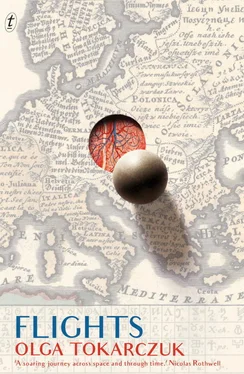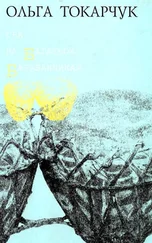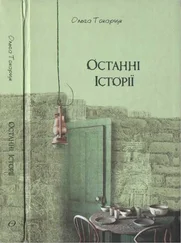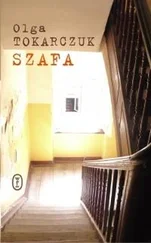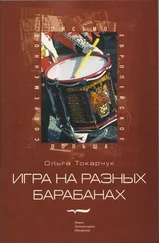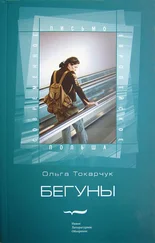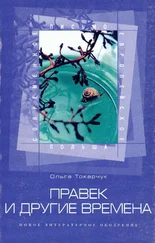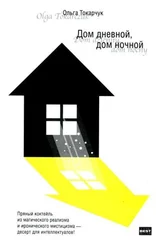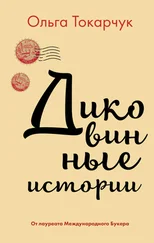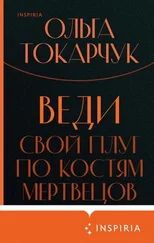‘For you are the saviour of ships, the tamer of war-steeds, blessed art thou, O Poseidon, wielding the earth, raven-haired and fortunate, show mercy upon the sailors,’ she’d say under her breath, and then she’d throw her barely started cigarette to the god, her daily allocation – an act of pure extravagance.
The ship’s trajectory hadn’t changed in five years.
From Piraeus it went to Eleusis, then to Corinth, and from there back south, to the island of Poros, so that the passengers could see the ruins of Poseidon’s temple and meander around the little town. Then their route took them to the Cyclades – it was all supposed to be unhurried, even lazy, so that everyone could bask in sun and sea, in the views of the towns arrayed along the islands, towns with white walls and orange roofs, scented by lemon groves. High season hadn’t started yet, so there wouldn’t be hordes of tourists – these the professor was always disparaging, unable to conceal his impatience. He felt that they looked without seeing, their gazes sliding over everything, alighting only on whatever their mass-produced guidebooks pointed out to them specifically – the print equivalent of a McDonald’s. Next they stopped on Delos, where they would study the temple of Apollo, and then finally they’d head for the Dodecanese island of Rhodes, completing their excursion there and flying home from the local airport.
Karen was fond of the afternoons when they docked at little ports, and, dressed for walking – the professor with the scarf he simply had to have around his neck – they’d go into the town. Bigger boats would also moor at these ports, and when they did the local merchants would immediately open up their little shops to offer visitors towels with the name of the island, sets of shells, sponges, mixes of dried herbs in tasteful baskets, ouzo or just ice cream.
The professor walked valiantly, indicating landmarks with his cane – gates, fountains, ruins encircled by frail barriers, and he’d tell stories his listeners would never be able to find even in the best guidebooks. These walks were not included in his contract, though. It stated just a single lecture every day.
He would begin: ‘I’m of the belief that human beings need, to live their lives, more or less the same climactic conditions as lemons.’
He’d raise his gaze to the ceiling dotted with little round lights and let it stay there for a moment longer than was strictly permissible.
Karen would clench her hands until her knuckles went white, but she thought she managed to contain the intrigued, lightly provocative smile – raised eyebrows, irony across her face.
‘This is our point of departure,’ continued her husband. ‘It is not by chance that the range of Greek civilization coincides, roughly speaking, with the incidence of citrus. Beyond this sun-drenched, life-giving realm, everything undergoes a slow, but inevitable, decline.’
It was like an unrushed, protracted take-off. Karen saw the same picture each time: the professor’s plane would stagger, its wheels dipping down into a rut, maybe even running off the runway – so he would take off from the grass. But in the end the engine would kick in, tossing from side to side, rocking, and by then it would be clear the plane would fly. And Karen would let out a discreet, relieved sigh.
She knew the topics of the lectures, knew their outlines from the index cards covered over in the professor’s miniscule handwriting, and from his notes that she would use to help him if something were indeed to happen – she could stand up from her seat in the first row and latch onto any of his sentences halfway through and just proceed, along the path he’d beaten. But it was true she wouldn’t speak with the same eloquence, nor would she permit herself the little quirks with which he held his audience’s attention, without even always being aware of them. Karen would await the moment when the professor would stand up and start pacing, which meant – returning to her picture – that his plane had reached its cruising altitude, that everything was fine, that she could now simply walk out onto the upper deck and extend her gaze in joy over the surface of the water, letting it linger on the masts of the yachts they had passed, on the just-traced mountain peaks in the light white mist.
She looked at the listeners – they were sitting in a semi-circle; those in the first row had notebooks before them on their small folded-out tables, eagerly jotting down the professor’s words. Those in the last rows, around the windows, lounging, ostentatiously indifferent, were also listening. Karen knew it was these rows that produced the most inquisitive among them, the ones who would later exhaust the professor with questions, calling her into the service of shielding her husband from all additional – now unpaid – consultations.
She was amazed by this man, her own husband. It seemed to her that he knew everything there was to know about Greece, everything that had been written, excavated, ever said. His knowledge wasn’t so much enormous as monstrous; it was made up of texts, quotes, references, citations, painstakingly deciphered words on chipped vases, drawings not entirely intelligible, dig sites, paraphrases in later writings, ashes, correspondences and concordances. There was something inhuman in all this – to be able to fit all that knowledge in himself, the professor must have needed to perform some special biological procedure, permitting it to grow into his tissues, opening his body to it and becoming a hybrid. Otherwise, it would have been impossible.
It was clear that such an enormous stock of knowledge could not be put in order; it had instead the form of a sponge, of deep-sea corals growing over years until they started to create the most fantastic forms. This was knowledge that had already attained critical mass and had since crossed over into some other state – it appeared to reproduce, to multiply, to organize in complex and binary forms. Associations travelled down unusual routes, likenesses were found in the least expected versions – like kinship in Brazilian soap operas, where anyone could turn out to be the child or husband or sister of anybody else. Well-trodden paths turned out to be worth nothing, while those thought untraversable proved convenient routes. Something that meant nothing for years suddenly – in the professor’s mind – became the departure point for some great revelation, a real paradigm shift. She had an unshakeable awareness of being the wife of a great man.
As he was speaking, his face changed, as though his words washed it clean of old age and exhaustion. A different face emerged: now his eyes shone, his cheeks lifted and tightened. The unpleasant impression of a mask that face had made only moments earlier now faded. It was as much of a change as if he had been given drugs, a small dose of amphetamines. She knew that when that drug wore off – whatever kind of drug it was – his face would freeze back, his eyes go matte, his body would slump into the nearest armchair, taking back on that appearance of helplessness she knew so well. And she would need to lift that body carefully, by its armpits, prod it ever so slightly, lead it dragging its feet and swaying to a nap in their cabin – it would have expended too much energy.
She knew the course of the lectures well. But each time it brought her pleasure to observe him, like putting a desert rose in water, as though he were recounting his own history rather than that of Greece. All the figures he mentioned were him, that was obvious. All the political problems were his problems, personal as possible. Philosophical concepts – those were what kept him up at night; they belonged to him. The gods he knew intimately, of course; he had lunch with them daily, at a restaurant near their house. Lots of nights they’d stayed up talking, drinking an Aegean Sea of wine. He knew their addresses and phone numbers, could call them up at any time. Athens he knew like the inside of his pocket, though not (needless to say) the city they’d just set sail from – that one, truth be told, did not interest him in the slightest – but rather the old Athens, from the times of, let’s say, Pericles, and their map was overlaid onto today’s layout, rendering the present one spectral, unreal.
Читать дальше
